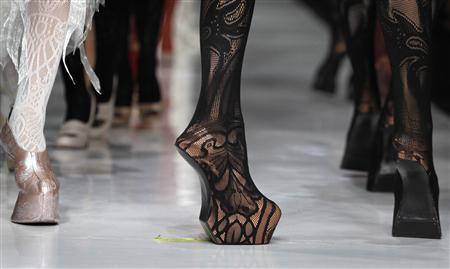(Reuters) – As the world’s most populous Muslim country, Indonesia has high demand for clothing that adheres to religious rules emphasizing modesty for women.

But as the stylish, colorful and cool outfits at Jakarta Fashion Week showed, the Southeast Asian nation also aims to be the global leader in the Muslim fashion industry that is worth nearly $100 billion by some estimates.
Indonesia’s government is championing young designers and the garment trade, which employs more than 3 million people and contributes about $15 billion to the economy.
“We can be the trend-setter,” said Mari Pangestu, the tourism and creative economy minister. “We have the vision and mission that Indonesia can be the capital of Muslim fashion.”
Often perceived as conservative and requiring women to be covered from head to toe, the rules range from strict interpretations of modesty in Saudi Arabia and Afghanistan to more moderate versions in Malaysia and Indonesia.
Headdresses are compulsory in any case and outfits should not be tight or see-through, but the three young Indonesians who kicked off Jakarta Fashion Week were clearly challenging stereotypes with their ready-to-wear collections.
Nur Zahra showed folk designs in organic materials with natural colors, mainly indigo and khaki.
Jenahara Nasution’s Eastern Opulence line was sleekly cut with linings of flowing organdy and chiffon silk, accented with traditional Tasikmalaya embroidery from West Java.
Dian Wahyu Utami’s Dian Pelangi brand delved into the 1960s with bursts of bright colors in batik prints.
MODERN AND COOL
The three designers – all participants in the government’s Indonesia Fashion Forward program to develop young talent for the international market – said they wanted to create clothes with broad appeal, including for women in Western countries.
“To make Muslim wear so the people look cool has always been my mission,” said 27-year-old Nasution.
Her Jenahara brand is in talks with an agent from Milan to market the collection in Italy, Russia and Dubai. She said her production capacity has nearly doubled since last year.
“The agent had an initial order of 200 pieces per season,” Nasution said. “But after they checked out my collection, they wanted me to sign a three-year contract.”
Wahyu Utami, whose parents started the Dian Pelangi brand 22 years ago using her first name, went to her first show five years ago in Melbourne. She got a “wonderful response” and plenty of interest in her next collections, she said.
“I realized there is international potential for this Muslim fashion,” she said.
Dian Pelangi now has a branch in Malaysia and is expanding into Singapore and Brunei. It has buyers in Australia, Egypt, the United Arab Emirates, Jordan and Kuwait. The collections were also sold at shows in France, Germany, Hungary and other European countries.
“We haven’t reached the United States yet, so that is our next target. I also want to open my own stores in the Middle East, not just sell our collection in department stores,” Wahyu Utami said.
“Korea is famous for its K-Pop culture and Indonesia is famous for its Muslim wear, so why don’t we focus on that?”
(Editing by John O’Callaghan)





